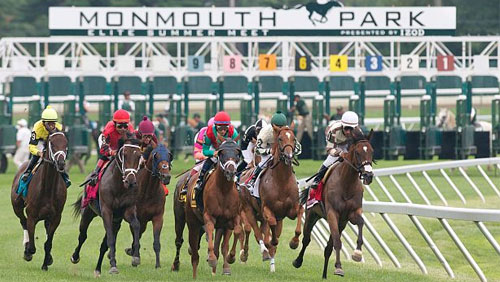The Monmouth Park Racetrack in New Jersey has a mammoth-sized lawsuit on its hands. The racetrack is said to be suing a number of sports leagues over claims that they repeatedly worked to suppress sports gambling in the country, causing it to lose millions in revenue.
 The lawsuit was filed in May in the U.S. District Court of New Jersey by the New Jersey Thoroughbred Horsemen’s Association (NJTHA). It claimed that it has lost a minimum of $130 million since 2014 due to the actions of the NCAA (the body that oversees collegiate sports in the United States), the NFL, the NHL and the MLB. The lawsuit reads, in part, “The leagues’ actions nearly put Monmouth Park out of business, inflicted significant financial and emotional hardship on hundreds of innocent Monmouth Park workers, and jeopardized the continued viability of New Jersey’s entire equine industry.”
The lawsuit was filed in May in the U.S. District Court of New Jersey by the New Jersey Thoroughbred Horsemen’s Association (NJTHA). It claimed that it has lost a minimum of $130 million since 2014 due to the actions of the NCAA (the body that oversees collegiate sports in the United States), the NFL, the NHL and the MLB. The lawsuit reads, in part, “The leagues’ actions nearly put Monmouth Park out of business, inflicted significant financial and emotional hardship on hundreds of innocent Monmouth Park workers, and jeopardized the continued viability of New Jersey’s entire equine industry.”
Despite attempts by the leagues’ lawyers to deem the suit “meritless, if not frivolous,” the NJTHA is pushing forward. This week, the association argued that the May decision by the U.S. Supreme Court to overturn the Professional and Amateur Sports Protection Act (PASPA) was proof that the leagues have worked to block Monmouth Park from allowing sports betting as far back as 2014.
The NJTHA pointed out that it partnered with William Hill in 2014 to establish a sports book at its facility. However, as it was preparing to launch operations, the leagues filed for a restraining order that prevented them from moving forward. The restraining order was granted, but the leagues were forced to put up a bond in the amount of $3.4 million to cover lost costs in the event the case didn’t proceed.
Now that PASPA has been axed, Monmouth says that the leagues should be on the hook for the $3.4 million, in addition to $127 million that it paid out during the legal battle. According to the association’s president, Dennis Drazin, “When you add up the numbers from lost earnings since 2014 it comes to $150 million to $200 million, and it may be more.”
The suit also states, “The leagues had a choice to either abandon their request for an injunction against the NJTHA or run the risk of paying damages if the injunction proved to be improvidently granted. In essence, the leagues and their surety made a $3.4 million bet and confirmed it in a contract that the injunction would be sustained.”
The sports groups have argued that they were only protecting themselves based on current law at the time, arguments that they emphasize “were repeatedly held to be well-founded.”